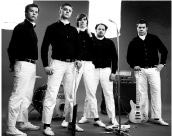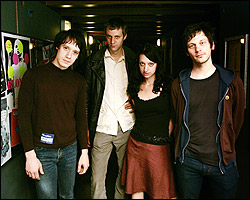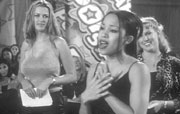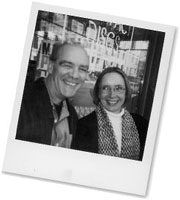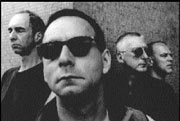THE HIVES WITH THE MOONEY SUZUKI, THE REIGNING SOUND, AND ONE MAN ARMY
Showbox, 628-3151, sold out 9 p.m. Fri., May 31
SURE, IT’S ROMANTIC to believe your favorite bands formed in the most organic of ways: randomly shared bus seats, a spilled drink at some long-ago show, a common ex-girlfriend—or at the very least, that they met through the local alt-weekly “Seeking Musicians” listings. The truth is that many of rock’s most notable outfits—from the Monkees to the Sex Pistols—were the products of far more calculated efforts and might not have existed at all but for an aspiring Svengali bent on molding a gang of impressionable youths.
The Hives are part of this long musical tradition, and so far, things have worked out pretty well for the Fagersta, Sweden, natives. Boasting a frontman with a fine Mick Jagger hustle, the best cartoon/ cut-and-paste video on MTV since A-ha’s “Take on Me,” and an Epitaph/Warner Bros. album that, nearly two years after its initial release, is still flying off store shelves, the Hives are among the new groups who’ve been anointed the Next Big Thing.
A very long-distance phone conversation with the band’s guitarist Nicholaus Arson reveals—in understandably strange syntax—a method to the Hives’ madness. The following is our interpretation of the band’s six-point plan for world domination.
1. Spend your salad days listening to the Ramones and the Stooges, even if you’re living in Sweden.
“We grew up on a fairly straight diet of American rock. There was a lot of Swedish punk music, but the Swedish punk has been inherited fairly straight from the British punk and the American punk.”
2. In your teenage years, be available to a shadowy producer/ songwriter determined to orchestrate the next rock ‘n’ roll overthrow via the perfect boy band.
“As soon as you say you’re in a put-together band, people immediately think of the Backstreet Boys or something. People try and expose Randy Fitzsimmons [the Hives’ mysterious Malcolm McLaren figure] and say that [we’re] not real. We were 13-year-old kids when we started out . . . a couple years later at 17 or 18, you still don’t really have any idea. I started to think more than one day ahead when I was like 22 or something—before that you sort of go ahead with whatever’s happening. We just did what we thought was fun. If we would have been aiming for success, we would have quit years before.”
3. For your own protection, develop a list of credible manufactured bands (T-Rex, the Runaways, etc.) as well as some decent metaphorical examples.
“I don’t know, whenever I think of a put-together band, I think of Motown. But I guess it’s just sort of grown to be a bad thing. It’s like hot-rodding in a way: If you want to have the fastest car, you can’t just use the original parts. It’s like having a put-together car and having the end product be the best—that’s sort of how it works. Whenever the product comes out like really, really good, you can’t be complaining about it being a put-together band.”
4. Commence recording some songs. Tour endlessly in support of them.
“We were just happy playing around. Pretty much the only thing we wanted to do was release records. We liked playing. We pretty much took all the shows we could get. America’s kind of far away; the world is sort of getting smaller, but when we started, it was kind of far away. We played somewhere and grew popular there, we played somewhere else and got popular there. . . . I think we did seven European tours off 2000’s Veni Vedi Vicious record. We just played all the time. And then when we thought we were going home, things took off in England, so we had to go there. So we played England for about six months. Now it’s time to go to America.”
5. While on the road, embrace the absurdity of rock’s grandeur.
“Showing up and just doing whatever—that’s what we’ve based our career on.”
6. Instruct your outspoken frontman to recite lines like, “Hello America, you love us!” with all the conviction of a preacher in the pulpit.
“We said that in the beginning when people hated us. I guess it was funnier in a way when no one really liked us. Because now when people like us . . . we can’t start saying people hate us, that would make the worst show.
We just go along with whatever we think is fun at the moment.”
